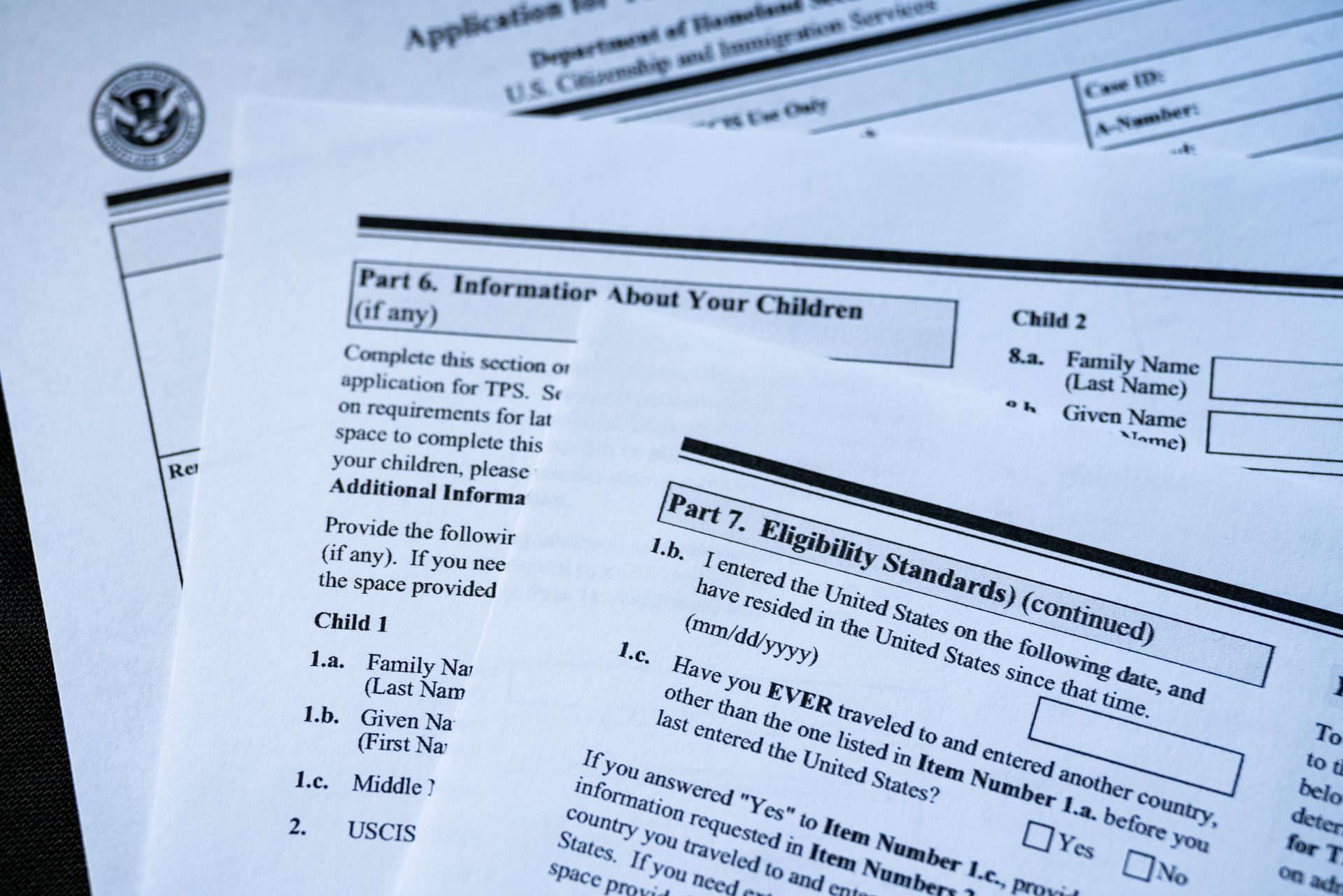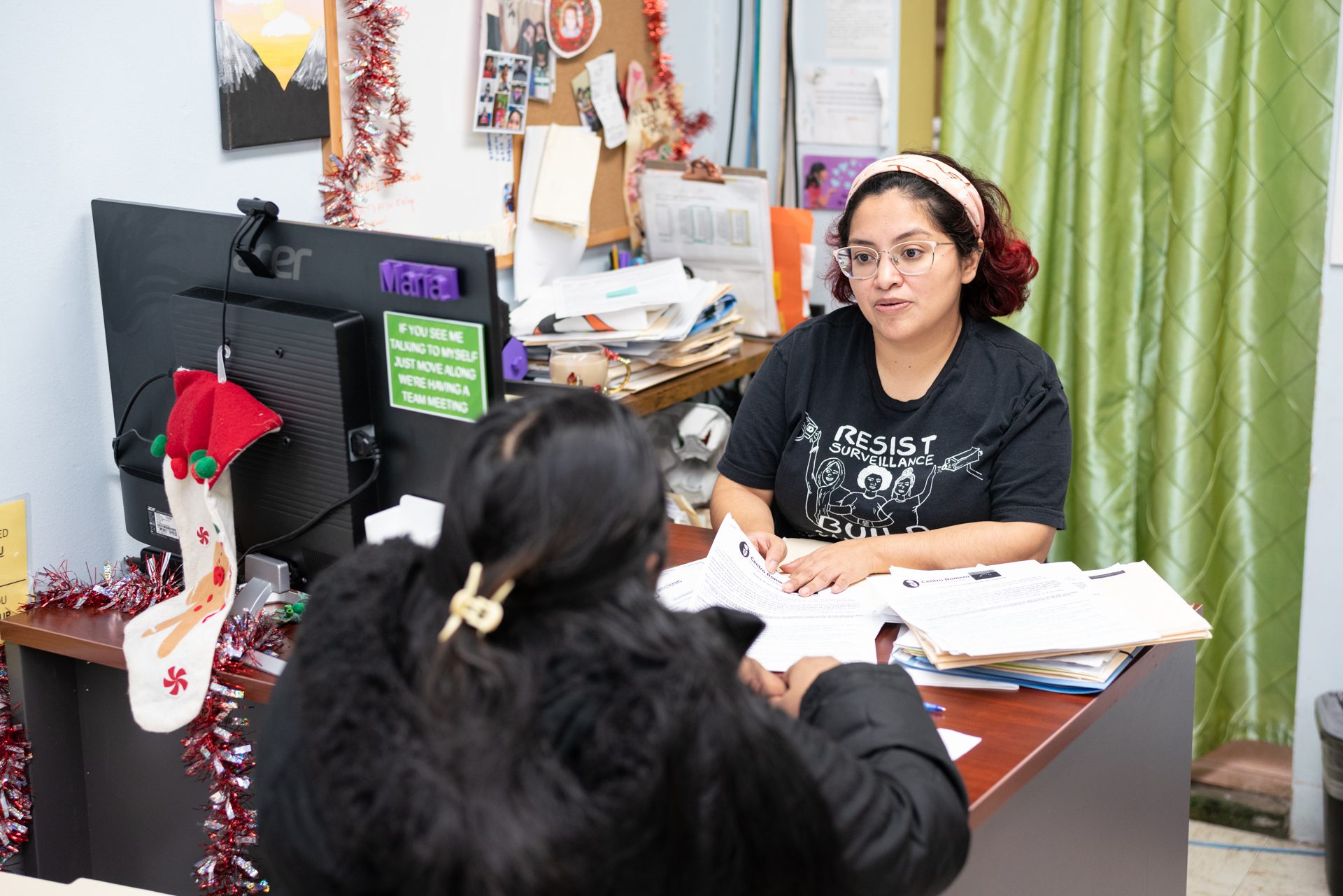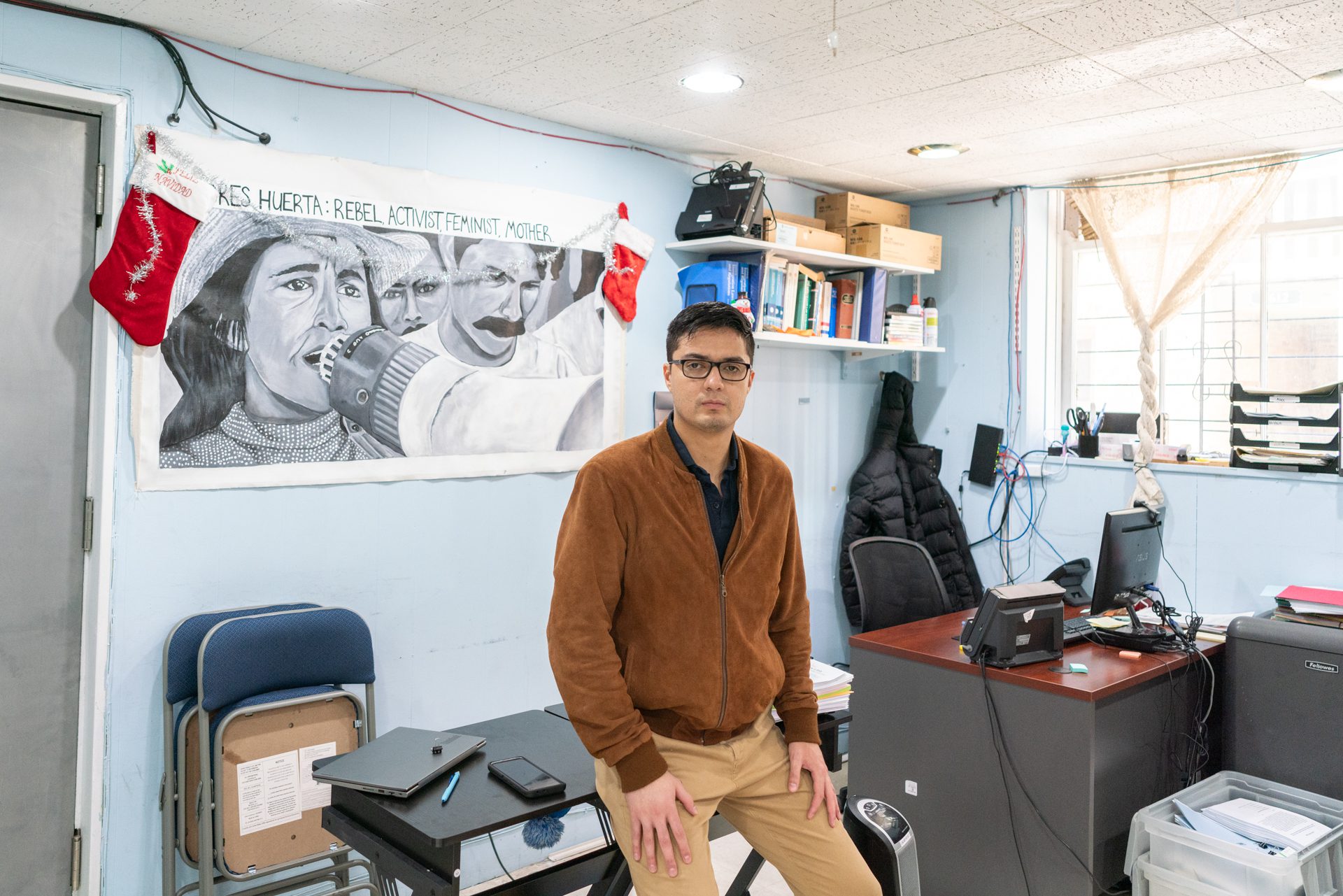 Max Herman/Borderless Magazine
Max Herman/Borderless MagazineAlthough President Biden expanded temporary protected status for Venezuelans, TPS’ language barriers, long wait times and costly application fees make it difficult for many immigrants to apply.
Leafy green plants line the window of a small, brick home in McKinley Park. Inside the dimly lit house, a shy gray and white cat has become Moises Gacias’ new friend, helping him stave off the loneliness of being in a new country. At night the Venezuelan migrant closes his eyes to the sight of the gray figure and wakes up alongside the small cat each morning.
News that puts power under the spotlight and communities at the center.
Sign up for our free newsletter and get updates twice a week.
Gacias made the 69-day trek to come to Chicago so that he could send money home to his wife, three children and his mother, who is recovering from surgery and being treated for cancer.
But in the six months he’s been here, Gacias hasn’t been able to get a work permit, and his hopes to support his family are unfulfilled.
As one of the more than 24,000 migrants who have arrived in Chicago since August 2022, Gacias’ options for working are limited. He could try to find illegal work. But even this work, which is often below minimum wage and with dangerous working conditions, is hard to find.

Another pathway to working is to apply for Temporary Protected Status (TPS), a designation that protects him from deportation and allows him to get a work permit. However, language and technological barriers, high application fees, long wait times and complicated application questions create a process that is inaccessible—and nearly impossible—for newly arrived immigrants like Gacias to complete.
“Sometimes they say that when you go into the U.S., there will be a lot of opportunities to work and to own things,” Gacias said. “But I cannot work if I don’t have a permit, and everywhere I go, they ask for it.”
In September, the Biden administration expanded the Temporary Protected Status (TPS) designation for Venezuelans who arrived in the U.S. before July 31, opening the door for thousands of Venezuelan immigrants in Chicago to apply for deportation protection and work permits.
While TPS would grant temporary protection from deportation, the program does not provide a pathway to citizenship for applicants.
Those who apply for TPS face backlogs in the immigration process, meaning that it could be months before they are able to legally work in the United States. And that’s only if they make it through the daunting and complex application process.
Read More of Our Coverage
Dozens of Questions, Fingerprints and $545
Before Gacias was able to submit his application, he struggled to fill it out. The application, which is entirely in English, requires the applicant to upload a photo of themself. However, the photo must be uploaded in a particular file format with very specific dimensions.
To complete the application, Gacias enlisted the help of a local volunteer he knew, but even then, the volunteer, who speaks fluent English and Spanish, could not help Gacias on her own. Taking and uploading the photo took them almost three hours. The online portal did not allow them to continue working on the application until they were able to upload the photo.
“You have to have a laptop, a printer, everything,” Gacias said. “Qualifying for TPS shouldn’t be a privilege for just one person. TPS should be for everyone equally.”
The TPS application has dozens of questions that span 13 pages, which ask the applicant about their criminal history, familial status, immigration status and more.
The application requires proof of residency and Venezuelan nationality. For Gacias, that meant asking his family in Venezuela to get official records from local authorities, such as his cédula, an identification card, before uploading a digital copy on an online application portal.

The application fee for TPS and a work permit is $545 for people between the ages of 14 and 65. The fees include a $85 fee for “Biometric Services,” which covers the cost of collecting biometric information, such as fingerprints.
The high application fees have been a barrier to many of the Venezuelan migrants trying to apply for TPS. Some describe an impossible situation where they don’t have a work permit but can’t find the money to apply for one without it.
‘We Hope, God Willing, to Have the Money’
Outside a food pantry in Pilsen, dozens of people line up for the pantry’s grocery and clothing distribution. Some have traveled across the city to get food, spending more than an hour on the bus to make it there. The cold air weaves through the line, carrying the urging bustle of voices down the block as people in line wait for the pantry’s doors to open.
Many of those in line are Venezuelan migrants and, like Gacias, have struggled to find work in the U.S. without a work permit.
“It’s been really hard because my husband is the only one working,” 28-year-old Nasareth H.** told Borderless while waiting in line with her young child. “I haven’t been able to find a job. It’s really, really hard. I can’t find a job at a restaurant or anywhere. Nothing.”
She said a Venezuelan community organization offered to help her family apply for TPS but estimated the cost would be nearly $2,000 to cover Nasareth, her husband and three children. After paying rent, the family saves what they can for the application fee.
“We hope, God willing, to have the money in two months,” Nasareth said.
Like Nasareth, other Venezuelan migrants told Borderless the application fees made applying impossible. One migrant said their family was waiting to see the outcome of their asylum application before deciding whether to apply for TPS.
There is an application to waive the TPS application fees, but that consists of a separate process from the TPS application and more waiting times, said Lisa Koop, director of legal services for the National Immigrant Justice Center.
“People have been living in limbo,” Koop said. “People have been living without a lot of security, and people have been living without a clear path forward.”
Read More of Our Coverage
‘What You Can See is Desperation’
Most immigrants fill out the application with the help of a friend or local community organizations that provide free legal counseling because the application can be challenging to fill out on one’s own for non-English speakers. The application also requires reliable internet access, a printer for the documents and a scanner to upload them.
Centro Romero, a refugee and immigrant services organization on the northeast side of Chicago, offers legal services to immigrants, helping many of them apply for programs such as TPS. The organization is overwhelmed with the needs of the thousands of newly arrived immigrants in Chicago, said Diego Samayoa, Centro Romero’s associate director.
Many of the immigrants may not know where to seek help in the first place, Samayoa explained, or that they are eligible to apply for programs like TPS, which are essential pathways to living and working in the U.S.

“TPS is a solution that allows [immigrants] to sleep at night knowing that they are not deportable,” Samayoa said.
On the federal side, there were more than 200,000 TPS applications being processed nationwide by U.S. Citizenship and Immigration Services (USCIS) as of March 31, 2023 — a total that doesn’t include the thousands of immigrants currently submitting applications for TPS after Venezuela was redesignated for the status two months ago.
Samayoa said he’s seen applications take anywhere between two to six months to process. According to USCIS, the median time it took to process TPS applications in 2023 was roughly 12 months.

Samayoa recalls helping a family through Centro Romero’s legal immigration department and meeting their young child, who was only two or three years old at the time. Spotting the plant next to a desk, the hungry child began eating the plant’s green leaves and the sand in its pot.
The family had traveled through the Darién Gap to come to the U.S., trekking 60 miles through marshland, mountains and rainforests in the jungle between Panama and Colombia. The child, Samayoa said, had gotten used to eating plants while making the trek to the U.S., because there was nothing else to eat.
“In most of the cases, what you can see is desperation,” Samayoa said. “They do want to work, and they do want to put bread on the table by providing value to the community…[But for] someone that has been here months, and they know that they cannot work legally in the U.S., what do you do to survive?”
A Broader Solution for Work Permits
Policy advocates have been pushing for the expansion of work permits to more immigrants outside of the TPS program and working for more permanent solutions for those wanting to work legally.
Chicago Ald. Jessie Fuentes (26th) has pushed for a resolution that, if passed by City Council, would call on the Biden administration to issue work permits to newly arrived migrants as well as undocumented residents who have lived in the U.S. for longer so they can work legally here. The resolution, which is supported by many business associations as well as immigrant organizations, was passed by the city council’s immigration committee last Thursday and could be up for a full council vote this week.
In the immigration committee meeting’s public comment portion, Illinois Restaurant Association President Sam Toia spoke of the industry’s struggles with severe labor shortages, which dramatically impact every restaurant due to Congress’ “failure to solve our immigration challenges.”
“The solution to this problem is already here,” Toia said. “Millions of migrants and long-term undocumented immigrants are here, ready to work. But we need the government to make it possible.”
For Gacias, being able to work would not only mean being able to support himself in the U.S., but also supporting his mother in Venezuela, who needs money for medicine, and his wife and children.
“It hurts me not being next to her,” Gacias said of his mother. “I’ve lost everything.”
Despite the uncertainty of his TPS application and the difficulties he faced while applying, Gacias thinks of those who are less fortunate than him, and who may not even be able to apply in the first place.
Gacias has an address because he’s living with a friend, for example, but people who don’t have a permanent address cannot apply for TPS because applicants need proof of residence and a mailing address to receive updates on their applications.
“This has to be for everyone, not just for one person,” Gacias said. “Whether you’re Venezuelan or Mexican, whatever you are, you should be respected.”
“This has to be for everyone, not just for one person,” Gacias said. “Whether you’re Venezuelan or Mexican, whatever you are, you should be respected.”
As he waits to hear whether he will receive a work permit and TPS, Gacias spends his days giving back to the community, volunteering at food pantries and working with mutual aid organizations to distribute food and other donations to other immigrants.
He says that thinking about his mother in Venezuela, all he has sacrificed to get here and those who have helped him in Chicago have kept him moving forward. Now, he wants to help other migrants like him, who got their start living in shelters and on the streets.
“What motivates me are the people here in the community,” Gacias said. “If it weren’t for them, I would have already gone back.”
*Moises Gacias chose to use a pseudonym to protect his safety and privacy.
**Nasareth H. chose not to use her full name to protect her safety and privacy.


